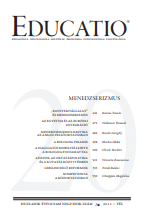Lebilincselő reformok - A No Child Left Behind törvény oktatásirányítási vonatkozásai Niklas Luhmann rendszerelmélete alapján
Ambiguous Reforms - The Control Mechanism of the No Child Left Behind Act on the Bases of Niklas Luhmann’s System Theory
Author(s): Balázs TörökSubject(s): Education, Geography, Regional studies, Communication studies, State/Government and Education, Policy, planning, forecast and speculation
Published by: Akadémiai Kiadó
Keywords: education; reforms; no child left behind; NCLB; US; Niklas Luhmann’s System Theory;
Summary/Abstract: In September 2011, President Obama announced a revising of the „No Child Left Behind” (NCLB) Act. In the United States this reform program was one of the most important initiatives in the field of education in the last decade; and everyone agreed with the main objectives – to increase the efficiency of the education system. Yet the strict management techniques used to implement the reform were dubious. What is the background to Obama’s reforms and the revisions? How can one understand the process on the basis of Niklas Luhmann’s system theory? The real complexity of an education system cannot be mapped out at central government level - thus every reforming leadership needs to adapt a model so the system has some controls. This paper looks at the different elements of managerial rationality within the control mechanism of the NCLB. On the bases of Luhmann’s theory, we note that a business model of governance flourishes if negative externalities of reform interventions can be kept at manageable levels. Initially, reduced complexity – a strict business model in education – creates student achievement gains, yet after a certain time period disadvantages may turn up in the functioning of other system. Realized losses promote the change of the simplifying model. A new synthesis – evolution of the education system – should be based on communication, not on technology.
Journal: Educatio
- Issue Year: 20/2011
- Issue No: 4
- Page Range: 535-548
- Page Count: 14
- Language: Hungarian

